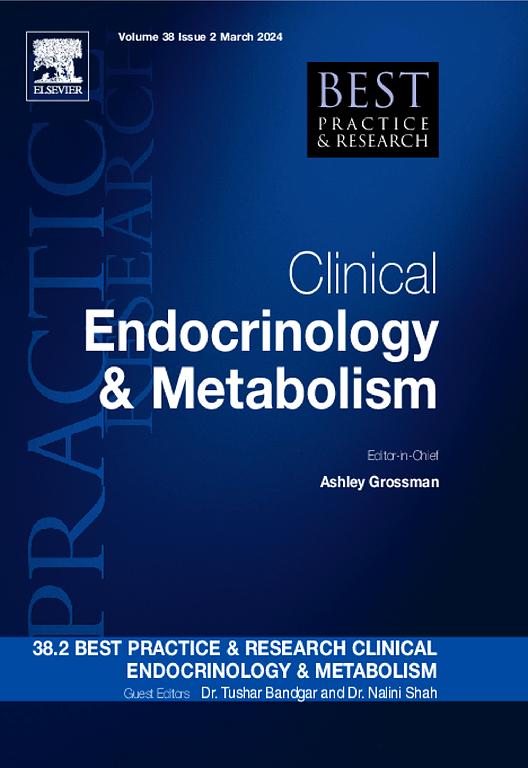Outcomes of recombinant growth hormone therapy in the traumatic brain injury population: A scoping review
IF 6.1
1区 医学
Q1 ENDOCRINOLOGY & METABOLISM
Best practice & research. Clinical endocrinology & metabolism
Pub Date : 2025-05-01
DOI:10.1016/j.beem.2025.102015
引用次数: 0
Abstract
Background
Post-traumatic hypopituitarism (PTHP), including growth hormone deficiency (GHD), is a prevalent and underdiagnosed complication of traumatic brain injury (TBI), resulting in substantial morbidity. Emerging evidence suggests that recombinant human growth hormone (rhGH) therapy may provide benefit for patients with confirmed GHD, and also those with growth hormone insufficiency (GHI), abnormal growth hormone secretion (AGHS), or Brain Injury Associated Fatigue and Altered Cognition (BIAFAC), even when peak growth hormone response to growth hormone stimulation testing is above traditional GHD diagnostic cutoffs in these patients.
Objective
To conduct a scoping review evaluating the effects of rhGH in adults with TBI, including those classified as GHD, GHI, AGHS, or BIAFAC, on clinical, functional, and neurobiological outcomes.
Methods
A comprehensive search of PubMed/MEDLINE was performed using a peer-reviewed search strategy. Studies were screened in duplicate. Eligible studies included clinical trials, observational studies, and case series, reporting rhGH use in adults with a history of TBI, with or without GHD. Outcomes included quality of life, neuropsychological performance, physical functioning, biochemical markers, and neuroimaging data.
Results
Eleven studies met inclusion criteria: two double-blind, randomized, placebo-controlled trials; one double-blind, randomized, placebo-controlled crossover study; one double-blind, non-randomized, placebo-controlled trial; two non-randomized controlled trials; three retrospective cohort studies; and two open-label, single-arm trials.
Across the studies reviewed, the researchers reported improvements in insulin-like growth factor-1 (IGF-1) levels, fatigue, mood, physical performance, and cognition. Structural and functional neuroimaging changes following rhGH were also reported, including increased cortical thickness and gray matter volume, and improved functional connectivity of somatosensory networks. Symptomatic improvement as well as improvements in objective measures were described among patients who did not meet diagnostic cut-point criteria for GHD.
Conclusion
Evidence suggests that rhGH may confer benefit in a broad range of symptomatic TBI patients, including those with peak growth hormone values in ranges overlapping with normal, healthy controls. Larger, controlled studies are warranted to validate these findings and inform clinical guidelines.
重组生长激素治疗外伤性脑损伤人群的结果:范围综述。
背景:创伤后垂体功能减退症(PTHP),包括生长激素缺乏症(GHD),是创伤性脑损伤(TBI)的一种普遍且未被诊断的并发症,导致大量发病率。新出现的证据表明,重组人生长激素(rhGH)治疗可能对确诊的GHD患者,以及那些生长激素不足(GHI)、生长激素分泌异常(AGHS)或脑损伤相关疲劳和认知改变(BIAFAC)的患者有益,即使这些患者对生长激素刺激测试的生长激素反应峰值高于传统的GHD诊断临界值。目的:对成人TBI患者(包括GHD、GHI、AGHS或BIAFAC患者)中rhGH对临床、功能和神经生物学结果的影响进行范围综述。方法:采用同行评议的检索策略,对PubMed/MEDLINE进行全面检索。研究是重复筛选的。符合条件的研究包括临床试验、观察性研究和病例系列,报告有或没有GHD的TBI史的成人使用rhGH。结果包括生活质量、神经心理表现、身体功能、生化指标和神经影像学数据。结果:11项研究符合纳入标准:2项双盲、随机、安慰剂对照试验;一项双盲、随机、安慰剂对照交叉研究;一项双盲、非随机、安慰剂对照试验;两项非随机对照试验;三项回顾性队列研究;两项开放标签单臂试验。在回顾的研究中,研究人员报告了胰岛素样生长因子-1 (IGF-1)水平、疲劳、情绪、身体表现和认知的改善。rhGH后的结构和功能神经影像学改变也被报道,包括皮质厚度和灰质体积的增加,以及体感觉网络功能连接的改善。在不符合GHD诊断临界点标准的患者中,描述了症状改善以及客观测量的改善。结论:有证据表明,rhGH可能对范围广泛的有症状的TBI患者有益,包括那些生长激素峰值与正常健康对照重叠的患者。需要更大规模的对照研究来验证这些发现并为临床指南提供信息。
本文章由计算机程序翻译,如有差异,请以英文原文为准。
求助全文
约1分钟内获得全文
求助全文
来源期刊
CiteScore
11.90
自引率
0.00%
发文量
77
审稿时长
6-12 weeks
期刊介绍:
Best Practice & Research Clinical Endocrinology & Metabolism is a serial publication that integrates the latest original research findings into evidence-based review articles. These articles aim to address key clinical issues related to diagnosis, treatment, and patient management.
Each issue adopts a problem-oriented approach, focusing on key questions and clearly outlining what is known while identifying areas for future research. Practical management strategies are described to facilitate application to individual patients. The series targets physicians in practice or training.

 求助内容:
求助内容: 应助结果提醒方式:
应助结果提醒方式:


